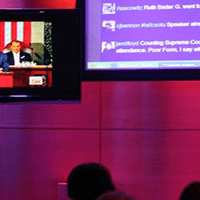Brooke Gladstone appears in the following:
Are Publishers Stuck In The Past?
Friday, April 20, 2012
The publishing industry is not the first to be shaken by a newly digital world. It’s also not the first to resist that change. Brooke speaks with Mathew Ingram, a senior writer at GigaOm, who thinks the publishers’ efforts to tame Amazon may delay a brighter future for the book industry.
Life After Publishers
Friday, April 20, 2012
As a newly minted editorial assistant at Norton, writer Tom Bissell was able to resuscitate an out-of-print novel called Desperate Characters by Paula Fox. In Bissell's new book, Magic Hours, he wrote about how, paradoxically, that experience shook his faith in publishing. Brooke talks to writer Tom Bissell about whether we as readers will miss the publishing industry, imperfect as it is, if it disappears.
How Publishing and Reading Are Changing
Friday, April 20, 2012
Publishers are trying to adapt as the book industry changes dramatically, and they're doing so in the face of rapidly changing reading habits among consumers. Publishing industry analyst Mike Shatzkin talks to Brooke about how readers' behavior is changing, and about ways the publishing industry might survive in the coming years.
The Story of Pottermore
Friday, April 20, 2012
Michael Shatzkin, publishing futurist, tells us the story of Pottermore, J.K. Rowling's one-woman attempt to challenge the mighty Amazon.
Harry and The Potters - This Book is So Awesome
Is Amazon A New Monopoly?
Friday, April 20, 2012
Without the ability to work together, industry watchers say the 'Big 6' publishers won’t be able to stop Amazon from pricing books as the company sees fit. Brooks speaks with Barry C. Lynn, a senior fellow at the New America Foundation, who believes that the DOJ decision opens the door to an Amazonian monopoly in the book industry.
New Endings
Friday, March 30, 2012
The video game series Mass Effect has earned millions in sales and near-universal critical acclaim, but the series' conclusion, released this month, was met with howls of rage by gamers. Their gripe? They hated the ending. In response, the game's developers have promised to add additional content that would give fans "more closure." Brooke talks to Grantland's Tom Bissell about whether or not dissatisfied gamers are entitled to a new ending.
The Convenience of the Co-op Controversy
Friday, March 30, 2012
Controversy broke out last week in Brooklyn New York, when members of the Park Slope Food Co-op argued over a proposed boycott of Israeli-made foods. Remarkably, coverage of the local dispute made its way into some prominent news outlets. Brooke muses about why the little feud became so large.
How Questioning "Obamacare's" Constitutionality Went Mainstream
Friday, March 30, 2012
When "Obamacare" first debuted, opponents of the legislation criticized its cost and reach—not the possibility that it might be unconstitutional. But this week the Supreme Court spent three days hearing arguments on the mandated health care law. Brooke speaks to Politico's Josh Gerstein about how challenging Obamacare on constitutional grounds went from a zany fringe idea to a mainstream conversation.
Personal Video Games
Friday, March 30, 2012
Anyone who’s played videogames like Call of Duty or Red Dead Redemption knows what kind of narratives they tell. Their protagonists are snipers or outlaws ready to fight missions that step outside all legal bounds. Game designers Anna Anthropy, Sebastian Janisz and Michael Molinari choose to tell very different stories. No ambushes, no clandestine ops or full throttle attacks. Brooke talks to the designers about their very personal games.
Trayvon Martin, Week Two
Friday, March 30, 2012
If last week Trayvon Martin’s death broke as a national story, then this week it reached a full boil. Every day new details have been leaked and analyzed, pundits have opined and the interested parties have sought to characterize each other. Brooke again talks with Huffington Post senior reporter Trymaine Lee about how this story has continued to develop.
The Curator's Code
Friday, March 23, 2012
One of the greatest assets of the internet is that it leads to great content discoveries that readers might not otherwise be able to find. One of the biggest liabilities is that content is frequently repackaged without crediting its creators or where it was found. Brooke talks to Maria Popova, editor of the website Brain Pickings and one of the creators of the Curator's Code, which seeks to honor the way people discover content online.
Updating Your Social Media After You Die
Friday, March 23, 2012
With social media, so much of our interactions with the world now live online, even after we may not be living at all. Brooke talks to James Norris, the founder of the website Deadsocial about prolonging social media relationships after death.
Reporting Fatigue
Friday, March 23, 2012
Atlantic editor Ta-Nehisi Coates has also been covering the Trayvon Martin story since very early on. However, he tells Brooke that he hesitated for a couple weeks before he started writing about the story. Coates says he sees so many stories about young black men who are killed in questionable circumstances, and those stories are rarely covered by the media.
Why the Trayvon Martin Story Took So Long to Gain Traction
Friday, March 23, 2012
Seventeen-year-old Trayvon Martin was killed by his neighbor on Feburary 26th, but the story didn't become ubiquitous until this past week. Trymaine Lee has been covering the story since very early on for the Huffington Post -- he talks to Brooke about why the story took so long to spread.
Is There Life After Facebook?
Friday, February 03, 2012
It’s easy to forget that Facebook has only been around for eight years. In that time, Facebook’s grown from a college dorm room project to a multi-billion dollar company, and made its 27 year-old founder the 4th richest person in the United States. But Facebook’s life represents an eternity in internet years, where sites live, dominate and die at historic speeds. Surely, then, Facebook must one day die, right? According to Clay Shirky, no one ought to hold their breath waiting for Facebook's demise.
Bangs - Meet Me On Facebook
The Greene Space
State of the Union Watch Party
Tuesday, January 24, 2012
7:15 PM
Once again, It's A Free Country invites you to watch the State of the Union address with your fellow politics junkies. Brian Lehrer will be there along with others from the It's A Free Country team and WNYC fans from left, right and center.
Freedom Of Information Laws Around the World
Friday, November 18, 2011
Over the last year the Associated Press has tried to answer a simple question: Of the more the 100 countries with freedom-of-information laws on the books, how many actually work? These laws are increasingly popular, but Martha Mendoza, the AP’s lead reporter on the project tells Brooke that when it comes to compliance talk is cheap.
Decade 9/11 Conversation: Brooke Gladstone and Fred Kaplan
Wednesday, September 07, 2011
Co-host and managing editor of NPR's On The Media and author of The Influencing Machine: Brooke Gladstone on the Media, Brooke Gladstone joins Slate’s War Stories columnist and author of 1959: The Year Everything Changed (and her husband), Fred Kaplan, to discuss how their respective beats have changed since 9/11 and how their family experienced 9/11 and the aftermath.
Video Club: The Impasse was More Fun on The West Wing
Tuesday, August 02, 2011
Sometimes political truth is stranger than political fiction, but the fiction is always more fun.
For that reason, It's A Free Country brings you Video Club with Brian Lehrer, in which our veteran analyst looks at the fun-house mirrors of our government's (in)action: television and the silver screen. What did the writers get right, and where did they flop? Why were the fictional characters more sympathetic, or more detestable? How did the political theater play out in real life? More often than not, it's the reality that looks funny.
To launch our new club, Brian watches the budget debacle unfold on The West Wing Season Five in an episode called "Shutdown." Then, Brooke Gladstone, co-host and managing editor of WNYC's On the Media, gives her take. You'll get a chance to weigh in as well.
Brooke Gladstone on the Murdoch Hacking Scandal
Wednesday, July 27, 2011
On the Media’s Brooke Gladstone gives a rundown of the Rupert Murdoch phone hacking scandal and looks at how it’s been covered by the media, how far and wide the scandal has spread, and what the repercussions of it will be in the British press, government, and here in the United States.
















